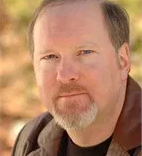A Day at Work
A few years after my first novels were published, David Brin asked me if I would collaborate with him on a short story. At the time, David was at the height of his career, winner of numerous awards, a New York Times bestselling author, one of the most respected names in the field. I, on the other hand, had far fewer credits. Although we had known each other for a while, I was still surprised by the offer. “Really? Why would you want to collaborate with me?”
“Because I want to figure out how you can be so prolific.”
So, we plotted and worked on the story, back and forth, but it never really came together. Finally, after about three months, David said to me, “All right, I’ve figured out how you can write so much. It’s because you write all the time.”
Granted, I love to write, and I’m even a little obsessive about it (okay, maybe very obsessive), but I’ve never understood why a full-time writer should expect to put in any less time “at work” than anyone else with a challenging full-time job. A teacher is expected to be at school before the buses arrive, teach classes all day, stay until after the students have gone (sometimes coaching after-school sports), and grade papers, often into the night. A doctor sees patients all day long, usually eight hours or more. A lawyer spends the entire day (and more) writing briefs, researching cases, meeting with clients, filing papers, appearing in court.
Why shouldn’t a writer put in a full day of work?
Right now I’m under several tight, concurrent deadlines (what else is new?). I have an office in my home, but that is often fraught with distractions. I occasionally take the laptop and hide in a local coffee shop, conveniently “forgetting” my cell phone in the car and turning off the internet access so I can concentrate on my editing. Other times, when I have a particularly heavy slate of writing/editing to do, I will go away for a few days, find an out-of-the way lodge or empty ski condo off season, where I can get a lot of uninterrupted work time. That’s where I am now, out in the mountains at a ghost-town ski resort (it’s at least a month before the lifts open).
On the morning I left, I spent two hours at home gathering notes and writing down ideas for a new “Seven Suns” trilogy proposal. Lots of big concepts, character sketches, plot ideas, which will take me a while to whip into shape, an overall blueprint for three 700-page novels. Then I packed my suitcase, drove to the grocery store to pick up supplies, drove to the accountant to retrieve our recently completed tax returns, and came home to have lunch with Rebecca. She is finishing her rewrite on our second Star Challengers novel, which she’ll email to me the day after I hole up in the lodge.
I drove two hours into the mountains to get to the ski resort, while listening to an audiobook on the way (a current bestselling thriller, so I can keep up with the market), and had a phone conversation with Brian Herbert about some background details in The Sisterhood of Dune, which I would be editing. After I checked in, mid-afternoon, I walked around the area for a while, thinking a bit more about the new Seven Suns proposal, then set up the computer in the room. I edited three first-draft chapters in The Sisterhood of Dune, two of mine and one of Brian’s, because that’s the order they appeared in the outline.
For dinner I heated up some leftover gumbo that my friend Paul had made, then worked on formatting the ancient Word files of my novel Assemblers of Infinity, a Nebula nominee that I wrote with Doug Beason. We’re putting some of my hard-to-find backlist titles up as ebooks; I have all the electronic rights to the novels, but they all require some cleanup and reformatting. Because the files were so old, the prologue and epilogue were corrupted, so I had to rekey them from my paperback copy of the novel—about ten pages. (Not fun.)
Then I watched the DVD of the original Boris Karloff Frankenstein film (research for a short story I was commissioned to write). After that, I took a bath and read four submitted manuscripts for Blood Lite 3, which I’m editing.
That’s a day at work, a fairly typical one. A lot of hours spent, and quite productive, but I wouldn’t say it’s much different than, say, a corporate executive, the owner of a busy restaurant, or a hospital administrator. A successful author doesn’t get to just write for an hour or two and then dink around the rest of the time.
This is my job. This is my career. This is how I make a living. And like anyone else who has a freelance occupation, if I don’t do work, I don’t get paid. If I don’t deliver what I promised in a contract, I’m not likely to get work again. A professional writer treats a day at work like a day on the job.
It’s the difference between a career and a hobby.
Don’t miss the next Superstars Writing Seminar, Jan 13-15 in Salt Lake City: no-nonsense business and career advice for the serious writer, taught by six bestselling writers, Kevin J. Anderson, Sherrilyn Kenyon, Brandon Sanderson, David Farland, Eric Flint, and Rebecca Moesta. Note that the early-bird price for the seminar goes up at the end of the month.



You must be logged in to post a comment.